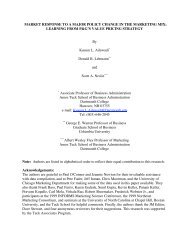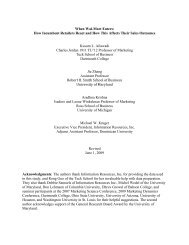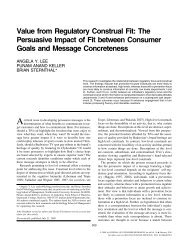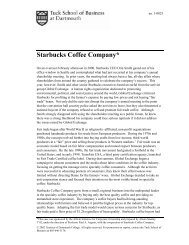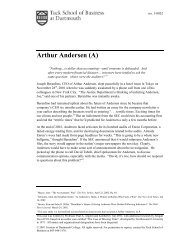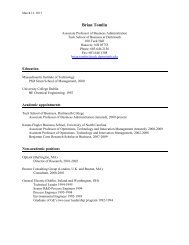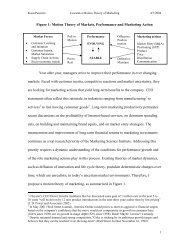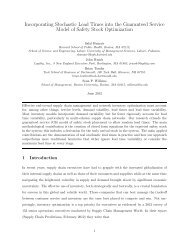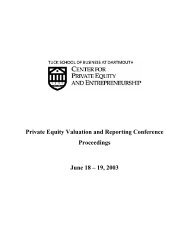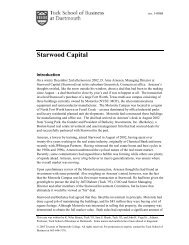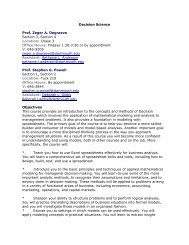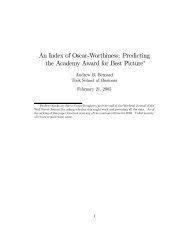tax notes international - Tuck School of Business - Dartmouth College
tax notes international - Tuck School of Business - Dartmouth College
tax notes international - Tuck School of Business - Dartmouth College
Create successful ePaper yourself
Turn your PDF publications into a flip-book with our unique Google optimized e-Paper software.
SPECIAL REPORTS<br />
such a case, the treaty could have simply stated<br />
that a dependent agent or agency shall be deemed<br />
to be PE <strong>of</strong> the enterprise; there was no need to<br />
say, as has actually been said, that an enterprise<br />
shall be deemed to have a PE by the virtue <strong>of</strong><br />
having a dependent agent and meeting one <strong>of</strong><br />
tests set out in the relevant sub article. Dependent<br />
Agent and the Dependent Agent PE, therefore,<br />
cannot be one and the same thing. 86<br />
Regarding the determination <strong>of</strong> the pr<strong>of</strong>its <strong>of</strong> the<br />
agency PE, the court relied on the OECD ‘‘Report on<br />
the Attribution <strong>of</strong> Pr<strong>of</strong>its to Permanent Establishments’’<br />
and followed the functionally separate entity<br />
approach by stating that:<br />
the pr<strong>of</strong>it computations <strong>of</strong> the PE have to proceed<br />
on the basis that the PE is wholly independent<br />
<strong>of</strong> its GE [General Enterprise], which from a<br />
purely accounting and commercial point <strong>of</strong> view,<br />
generally means nothing more than the hypothesis<br />
that intra organization transactions are to be<br />
taken into account at arm’s length price. 87<br />
According to the court:<br />
the DAPE and DA88 has to be, therefore, treated<br />
as two distinct <strong>tax</strong>able units. The former is a hypothetical<br />
establishment, <strong>tax</strong>ability <strong>of</strong> which is on<br />
the basis <strong>of</strong> revenues <strong>of</strong> the activities <strong>of</strong> the GE<br />
attributable to the PE, in turn based on the<br />
FAR89 analysis <strong>of</strong> the DAPE, minus the payments<br />
attributable in respect <strong>of</strong> such activities, in<br />
simple words, whatever are the revenues generated<br />
on account <strong>of</strong> functional analysis <strong>of</strong> the<br />
DAPE are to be taken into account as hypothetical<br />
income <strong>of</strong> the said DAPE, and deduction is<br />
to be provided in respect <strong>of</strong> all the expenses incurred<br />
by the GE to earn such revenues, including,<br />
<strong>of</strong> course, the remuneration paid to the DA.<br />
The second <strong>tax</strong>able unit in this transaction is the<br />
DA itself, but this <strong>tax</strong>ability is in respect <strong>of</strong> the<br />
remuneration <strong>of</strong> the DA. 90<br />
Regarding the AAR’s ruling in Morgan Stanley, the<br />
court stated that this argument was not persuasive as it<br />
is ‘‘well settled in law that these rulings have binding<br />
value only on the assessee and on the Commissioner<br />
with reference to that particular transaction.’’ 91<br />
The court went on to conclude:<br />
86 Id. at para. 8.<br />
87 Id. at para. 10.<br />
88<br />
DAPE stands for ‘‘dependent agent permanent establishment,’’<br />
and DA means ‘‘dependent agent.’’<br />
89<br />
The court uses this acronym to refer to functions performed,<br />
assets used, and risks assumed.<br />
90<br />
Indian Income Tax Appellate Tribunal, Apr. 20, 2007, decision<br />
535/Mum/04 and 205/Mum/04, para. 11.<br />
91<br />
Id. at para. 17.<br />
We are <strong>of</strong> the considered view that in addition <strong>of</strong><br />
the <strong>tax</strong>ability <strong>of</strong> the DA in respect <strong>of</strong> remuneration<br />
earned by him, which is in accordance with<br />
the domestic law and which has nothing to do<br />
with the <strong>tax</strong>ability <strong>of</strong> the foreign enterprise <strong>of</strong><br />
which he is dependent agent, the foreign enterprise<br />
is also <strong>tax</strong>able in India, in terms <strong>of</strong> the provisions<br />
<strong>of</strong> Article 7 <strong>of</strong> the <strong>tax</strong> treaty, in respect <strong>of</strong><br />
the pr<strong>of</strong>its attributable to the dependent agent<br />
PE. 92<br />
SET Satellite is an important case because it involves<br />
the effective application <strong>of</strong> the conclusions <strong>of</strong> the ‘‘Report<br />
on the Attribution <strong>of</strong> Pr<strong>of</strong>its to Permanent Establishments,’’<br />
despite the arguments raised by the <strong>tax</strong>payer<br />
against its legal status and applicability while no<br />
change in the wording <strong>of</strong> the OECD model convention<br />
or its commentary has been put in place. The judges<br />
had to reconcile the interpretation that seemed to be<br />
more appropriate with the relevant arguments raised by<br />
the <strong>tax</strong>payer, especially the legal status <strong>of</strong> the report,<br />
which, at the time <strong>of</strong> the judgment, was not part <strong>of</strong><br />
the commentary to the current OECD model convention.<br />
The report was not part <strong>of</strong> the commentary in<br />
place at the time <strong>of</strong> the conclusion <strong>of</strong> the India-<br />
Singapore treaty, which creates an additional argument<br />
for those that defend a static, rather than an ambulatory,<br />
interpretation <strong>of</strong> the commentary to the OECD<br />
model convention.<br />
As shown below, I believe this decision is correct<br />
and provides for the most appropriate interpretation <strong>of</strong><br />
article 7 regarding the attribution <strong>of</strong> pr<strong>of</strong>its to PEs.<br />
However, this decision was made by the Indian Income<br />
Tax Appellate Tribunal, so it is unclear whether<br />
the Supreme Court <strong>of</strong> India will uphold the decision or<br />
whether it will clarify its earlier ruling in Morgan Stanley<br />
and rule in favor <strong>of</strong> the <strong>tax</strong>payer.<br />
V. The Most Suitable Approach<br />
It seems safe to conclude that the authorized OECD<br />
approach is indeed the most appropriate approach to<br />
attribute pr<strong>of</strong>its to PEs.<br />
A. Adequate Allocation <strong>of</strong> Risks<br />
The single <strong>tax</strong>payer approach is quite attractive at<br />
first sight, as it provides for an outcome that is apparently<br />
quite logical: As the dependent agent is remunerated<br />
on an arm’s-length basis, both home and host<br />
states seem to get their fair share <strong>of</strong> the income that<br />
arises in a particular transaction. 93 The home state<br />
<strong>tax</strong>es the pr<strong>of</strong>its <strong>of</strong> the enterprise, while the host state<br />
is entitled to <strong>tax</strong> the income paid to the dependent<br />
92 Id. at para. 11.<br />
93 Para. 272 <strong>of</strong> the ‘‘Report on the Attribution <strong>of</strong> Pr<strong>of</strong>its to<br />
Permanent Establishment,’’ Part I (General Considerations),<br />
(2006).<br />
440 • FEBRUARY 2, 2009 TAX NOTES INTERNATIONAL<br />
(C) Tax Analysts 2009. All rights reserved. Tax Analysts does not claim copyright in any public domain or third party content.



